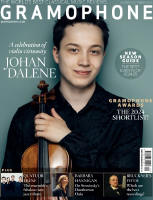Texte paru dans: / Appeared in:
|
|
|
|
|
|
The thrill of a fine Bach transcription lies in how a reimagining from the original can reaffirm the qualities and beauty in the music. The longstanding piano duo of Yaara Tal and Andreas Groethuysen takes us on a journey of lesser-known adaptations rather than the well-oiled oeuvre for solo piano from Liszt, Busoni, Saint-Saëns and pianist-arrangers in the Siloti and Feinberg mould. For all the enterprising and resourceful creativity of the two-piano world evident here, we remain largely rooted in the 19th-century lineage of virtuosic Romantic landscapes.
The only refashioning that seems to lean towards a more etched neoclassical model is a brilliant arrangement of Brandenburg Concerto No 6 by the Wagnerian Gustav Krug. The voicing here is exquisite, intensely focused on the clear inner dialogues of Bach’s gambas and, generally, adopts textural prudence at every turn. The second movement loses some air and luminosity with old-school gravity reasserting itself – but not on the scale of Gino Tagliapietra’s grotesquerie in his unrelenting Passacaglia in C minor, or indeed Christopher le Fleming’s monumental St Anne Prelude and Fugue, conceived for Cyril Smith and Phyllis Sellick. The latter mirrors some of the gothic vulgarities of Schoenberg’s orchestral behemoth, but the Fugue is far more tightly argued by arranger and performers alike, and the contrapuntal solutions at the close are impressive. More durable and intriguing are those arrangements that encourage the performers’ poetic qualities and instincts to emerge. I was hopeful for Alexander Kelberine’s Nun komm der Heiden Heiland but the over-burdening octave doublings have one running for Busoni’s classic. Schlummert ein also suffers from not having enough scope to transform the original much beyond a dutitful representation.
Schafe können (‘Sheep may safely graze’, as we know it) is far more supple in its conception, giving the fine solo piano version by Egon Petri a proper run for its money. Mary Howe’s transcription is a gem, deft distribution of voices transporting a weathered masterpiece into a fresh bucolic vision, and it is delectably played by Tal and Groethuysen. Melodic beauty and honeyed lines prevail in Cyril Scott’s established arrangement of the Andante from the A minor Solo Violin Sonata, where discreet harmonic additions (as Herbert Fryer applies in his atmospheric solo piano version of the Sarabande of the Sixth Cello Suite for Harriet Cohen) give the sense of a genuine period piece.
On the lines of the success of the Brandenburg Concerto realisation, and the ideal of how Bach in new clothes can deepen a sense of accomplishment and value, there is a nobly conceived transformation of Es ist vollbracht (from Cantata No 159, not the St John Passion) by Roy Douglas. This remarkable English polymath (who lived until he was 107) offers a depth of craftsmanship that brings this heartfelt baritone aria into an unforgettable sphere of spiritual resignation. The recital is a mixed bag, overall, but the best will lead to much repeated listening. |
|




